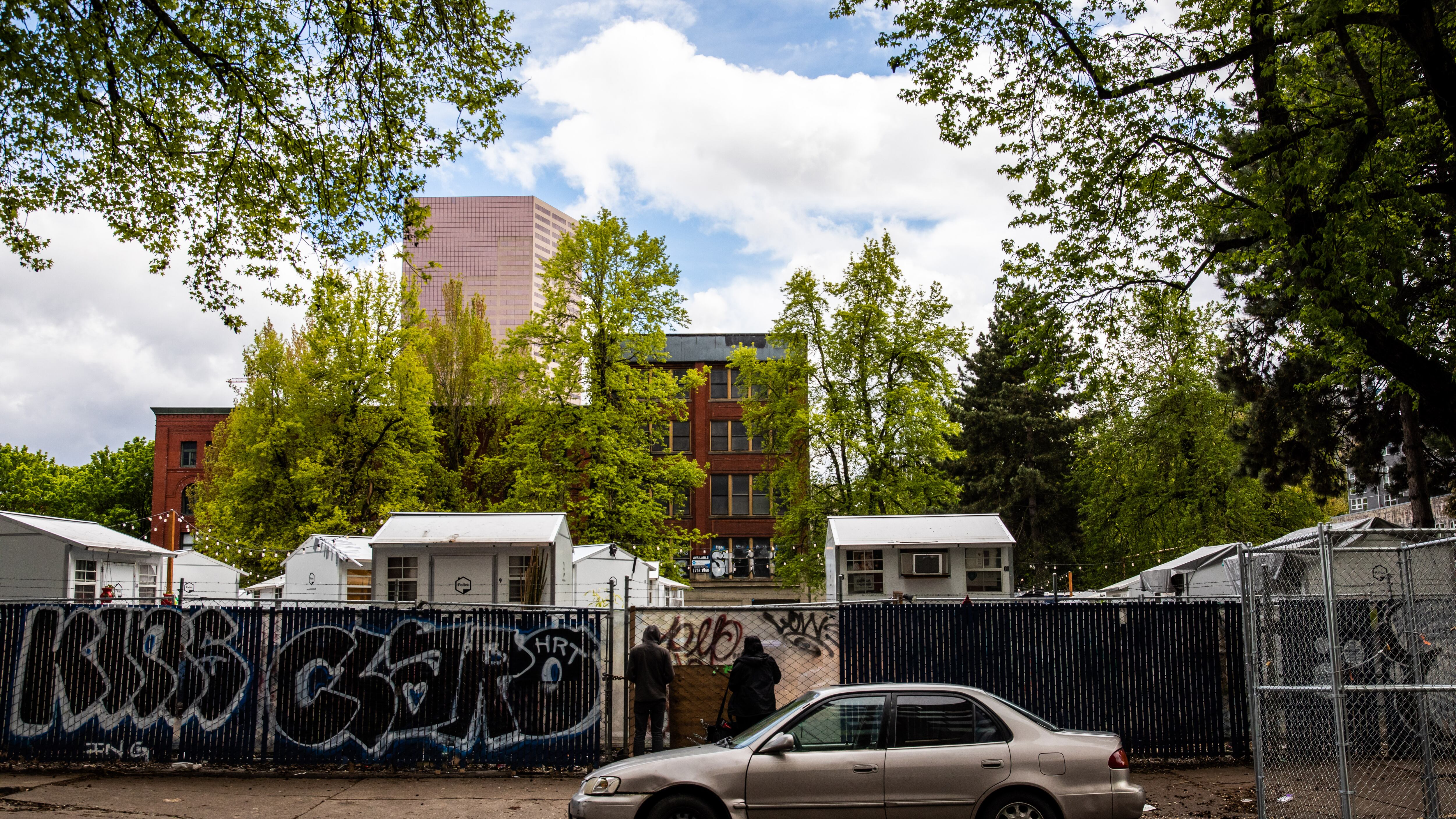Old Town’s homeless village is permanently closing, Multnomah County officials say, after its services provider, All Good Northwest, decided it could not continue running the site. The director of the nonprofit, Andy Goebel, blames its decision on “daily and nightly gunfire and gun activity” in the area.
The decommissioning, which officials confirmed after an inquiry from WW, also comes a month after a group of workers at All Good NW sent a letter to Goebel and other directors announcing their intent to form a union. A labor organizer says he doesn’t believe the union organizing caused the village closure.
Instead, he says, both labor unrest and the closure were a response to dangerous conditions at the village, located at the intersection of Northwest Broadway and Glisan Street.
The village will close in June.
The news of the impending closure raises questions about a dozen existing and planned officially sanctioned homeless villages in the region, as well as a key local services provider.
In April, local officials approved All Good NW to manage the new safe rest village in the Multnomah Village neighborhood of Southwest Portland. The nonprofit currently manages the Old Town, BIPOC and Queer Affinity “alternative shelter” villages under a $12 million Joint Office of Homeless Services contract.
Michael Rainey, a union drive organizer who works as a case manager at the Old Town village, says 18 of the village’s residents will move to the new Multnomah Village SRV, at the Jerome Sears Armory site, which will hold 30 sleeping pods. (That village isn’t open yet.) Some Old Town villagers don’t yet have a place to go, he adds.
The closure adds yet another frustration to the city’s slow construction of its planned six villages, as the Sears site will primarily now be occupied by former Old Town villagers when it opens.
People living in homeless villages—whether in the three “alternative” models that include Old Town, or the half-dozen new “safe rest” villages—are all classified by federal housing officials as “unsheltered,” like people residing in tents or vehicles. This year’s count, the first street count since 2019′s, showed a 50% rise in that population, to 3,057 out of a total 5,228, which includes shelters and transitional housing.
All Good’s services contract to manage these sites was set to expire in August 2024, but a new contract is expected for the fiscal year beginning in July, says Denis Theriault, spokesman for the city-county Joint Office, which awards the funds. Neither Theriault nor Goebel offered information about how the cancellation will affect funding or contracts.
WW has previously reported on alarming conditions in Old Town. Rainey says All Good NW management did not provide sufficient support to manage those challenges.
A drive-by shooting in February specifically targeted the village, Rainey says. No one was hurt, he says, but employees asked for training and support, which they haven’t gotten.
It’s part of a pattern, Rainey says, that began the day he started in November: “The first thing my manager said to me on my first day was [that] there was no training,” recalls the film school graduate, who had never worked in social services before. “It was just ‘Get to know the villagers,’ and that was it.” He’s still waiting for CPR training, he says, and “we’re still struggling to have enough Narcan on site to save people’s lives if necessary.”
A letter sent to All Good NW’s leaders signed by 14 of 35 eligible workers and dated April 22 refers to forgotten promises and a lack of support or clear protocols despite chaos and violence.
Goebel says “nothing on site at all had anything to do with the decision” to leave Old Town.
“The increased safety issues in the area around the Old Town Village just made it untenable for us to continue to provide support services there,” he says. Some staff “found themselves being first responders to shootings” and were “very concerned about being able to continue on at that site,” Goebel adds, but the organization will continue providing services up to final closure and the villagers’ well-being is still top priority.
“We’re saddened to have to leave that location,” Goebel says.
The one-block site, framed by Northwest Broadway, Hoyt, 6th and Glisan, is owned by Prosper Portland, and surrounded by Union Station, the former Greyhound bus station, an art college, and the new $94 million Gladys McCoy Multnomah County Health Department headquarters.
On Friday evening, the site was quiet, with a few tents on the sidewalk around a barbed-wire fence covered in colorful graffiti, lights twinkling atop white Pallet tiny houses. During a visit by this reporter in February 2021, an open-air drug market and tents lining busy Broadway felt chaotic.
Rainey says the Old Town location “was ideal” for its residents due to access to the adjacent Transition Projects day shelter, Central City Concern’s nearby Old Town Clinic, and other close-in services. As at the BIPOC and Queer Affinity villages, all founded during the pandemic as temporary “C3PO” communities, Rainey says Old Town residents struggled to transition from a partly self-governed model to one that’s more managed. Now, “the community is being broken up,” he says, “and it’s very dramatic for people who have experienced homelessness to find out that they’re losing their home that they thought they had for two years.”
As reported by the NW Labor Press, votes will be counted June 2 for a union-organizing effort at All Good NW; ballots are in the mail. While both Goebel and Rainey agree the union drive did not cause the village closure, it seems to reflect the same concerns.
The organization could have voluntarily recognized the would-be union but chose to fight it, Rainey says.
Goebel declined to comment on the union drive without consulting the nonprofit’s legal staff.
Sarah Thompson, organizing program manager at the Association of Federal, State, County and Municipal Employees Council 75, which represents nearly 2,000 behavioral health workers in Oregon, says former public-sector union jobs are being “subcontracted out to less-regulated agencies,” setting a lower bar for both worker and resident safety.
“It’s hard to say what’s intentional and what’s just incompetence,” Thompson tells WW, “but it feels like where to house the houseless is a problem nobody wants to solve.”
Yet Rainey still believes in the homeless village model, something this city has somewhat reluctantly led the nation in since Dignity Village’s shopping cart parades two decades ago.
While some have criticized them for their lack of plumbing or wired electricity, Rainey says, “we do have electricity and we do have bathrooms. They don’t always work. But the thing is, I honestly believe that this type of shelter could be very effective. The reason I’m organizing and not just quitting is I believe that All Good can actually do some good for the city. It’s just, we’re held back by management.”

